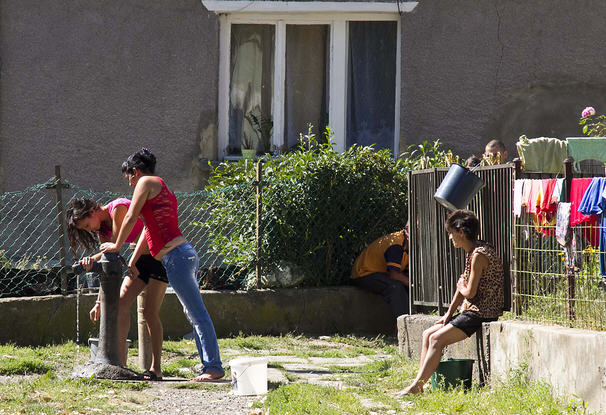New Discrimination: A dangerous shift for Hungary’s Roma
Roma communities throughout Eastern Europe experience discrimination every day from lack of access to quality healthcare to de facto segregation in many schools.
September 25, 2013 -
Lili Bayer
-
Articles and Commentary

ozd-nepszabadsag picture by Konyhas Istvan.jpg
This summer, events in the town of Ózd in northern Hungary raised the spectre of a new, dangerous form of direct discrimination against the struggling local community.
Once flourishing due to the metallurgic industry, Ózd is located in a depressed area, afflicted by a high unemployment rate. Although officially only 7 per cent of the population have declared themselves to be of Roma ethnicity, according to some estimates one-third of Ózd’s population may have Roma origins.
In early August, the city council in Ózd shut off the 27 water pumps which supply free, safe drinking water to the town. According to the European Roma Rights Centre (ERRC), 500 families in the area do not have running water in their homes and thus rely on the public water pumps. The city council’s decision directly targeted the town’s Roma community, who make up the majority of those who cannot afford to have water in their homes. Although pressure from NGOs and international institutions ultimately forced Ózd to restore the free water pumps, the town’s ethnically-motivated decision to completely terminate a crucial public service to the Roma community marks a turning point in the form and level of overt discrimination against the town’s Roma minority.
In the past, discrimination against the Roma community in Ózd has been widespread, but nearly always masked. Like in many other villages and towns throughout Eastern Europe, dozens of Roma families were evicted from their homes in Ózd in the late 1990s and early 2000s for either failure to pay bills or simply because the town council wished to “remodel” and bring new – non-Roma – residents to their neighbourhoods. In the mid-2000s, one study found that Ózd’s emergency ambulance service tended to arrive later – or not arrive at all – when Roma families called for assistance. Despite the ethnic prejudice that has contributed to the evictions and unreliability of emergency services, the discrimination manifested itself indirectly, generally in the ways in which the town and individual bureaucrats chose to target Roma residents.
When Ózd’s city council shut off the public water pumps in August, however, Ózd’s long-time indirect discrimination was replaced by direct and officially-sponsored racism. While previous discriminatory practices are perhaps equally harmful to the well-being of the Roma, in the past, authorities in Ózd have only engaged in small-scale racism – one missed ambulance, one apartment complex at a time – which could be easily disguised. This summer, the city council, which includes representatives from both the ruling Fidesz party and the opposition Socialist party, felt empowered to publicly and directly target the town’s most vulnerable population.
The city council’s decision to shut off the public water supply stems partly from the strengthening of Hungary’s far-right and a growing tolerance for racist public discourse in Hungarian society in recent years. The Fidesz government, while repeatedly attempting to defend its human rights record internationally, has done little to respond to racism domestically, even within its own party. As a result, discrimination is beginning to evolve from an informal and indirect practice into a potential public policy.
On the other hand, open and directly racist practices, especially at the local level, are not unique to Hungary. Most recently, authorities in Košice, Slovakia, have come under fire for tolerating the existence of a wall separating the town’s Roma community from the rest of the population. Local officials in places such as Ózd and Košice are becoming bolder and more assertive in publicly expressing their prejudices and implementing policies, which visibly disadvantage the Roma. Ultimately, these policies are designed to appeal to local constituencies which hold racist views. The latest European Commission poll found that only 9 per cent of Slovaks, 11 per cent of Czechs, 23 per cent of Hungarians and 47 per cent of Poles would feel “comfortable” about their children having Roma schoolmates.
While it is unclear whether political factors, economic hardships, or both are contributing to the persistence of these levels of prejudice throughout the region, so long as public opinion continues to hold such negative perceptions of their Roma neighbours, there is likely to be more and more alarming cases similar to that which took place in Ózd. Informal and indirect discrimination, which has contributed to the deterioration of the standard of living of the Roma since the transitions to democracy, will give way to more direct, officially-sponsored forms of discrimination, whether in the form of ending access to public services or formal attempts at marginalising Roma communities. Unless public attitudes change, Ózd’s public water pumps may again stop working.
Lili Bayer studied Russian and East European Studies at the University of Oxford. She is a contributing editor to Politics.hu, and a contributor to Vostok Cable.


































